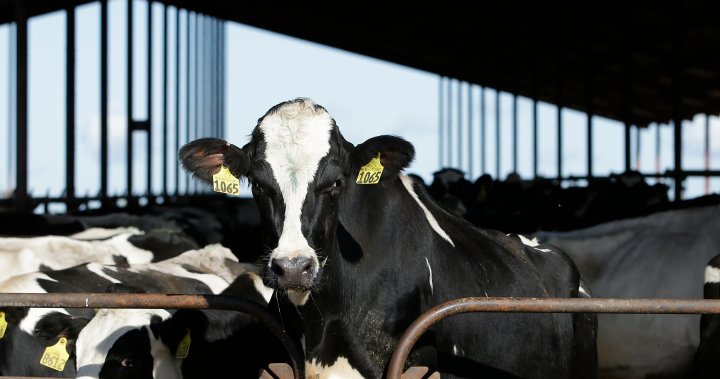Alberta officials are closely monitoring the ongoing bird flu outbreak in dairy cows in the United States, with avian influenza now being found in herds in 11 U.S. states. Dr. Keith Lehman, the chief provincial veterinarian with Alberta Agriculture and Irrigation, emphasizes the importance of dairy producers being vigilant and monitoring their herds closely to catch the disease as early as possible. Last month, Canada implemented new import requirements that lactating dairy cows from the U.S. must test negative for bird flu within seven days of export. However, there have been no reports of the disease in Canadian cows, as all milk sold in stores must be pasteurized, effectively killing the virus.
Lehman suggests various options for dairy farmers to minimize the risks of avian influenza entering and spreading in their herds. Some measures include isolating new animals and keeping them separate for a period before introducing them to the rest of the herd. There is also the option for testing animals for the virus before bringing them into the herd, with signs of infection in dairy cattle including reduced milk production, loss of appetite, and thicker milk consistency. On June 5, the World Health Organization confirmed the first-ever human death caused by a strain of bird flu, although the source of exposure to the virus is currently unknown. Lehman emphasizes the importance of monitoring the genetics of influenza viruses to determine their potential risk to human health, although at present, the risk of human-to-human transmission is not a concern.
The heightened awareness among dairy producers and the implementation of import requirements for U.S. dairy cows are key strategies in preventing the spread of avian influenza in Canadian herds. By closely monitoring herds, isolating new animals, and conducting testing for the virus, farmers can minimize the risks of infection and spread within their operations. The importance of pasteurization in ensuring that milk sold to consumers is safe from the virus is crucial, as this process effectively kills the virus. The potential for bird flu to pose an increased risk to human health is also a concern, and monitoring the genetics of influenza viruses is essential to assess this risk and prevent potential outbreaks.
The ongoing bird flu outbreak in dairy cows in the United States has prompted Alberta officials to advise dairy producers to monitor their herds closely, as avian influenza has been detected in herds in multiple U.S. states. Dr. Keith Lehman stresses the importance of early detection and prevention measures to protect Canadian herds from the disease. The introduction of new import requirements for U.S. dairy cows is a proactive step towards ensuring the safety of Canadian herds, with all milk sold in stores being pasteurized to eliminate the virus. Options such as isolating new animals, conducting testing for the virus, and monitoring signs of infection in dairy cattle are recommended strategies for farmers to minimize the risks of avian influenza entering and spreading in their herds.
The confirmation of the first human death caused by a strain of bird flu highlights the potential risks associated with the virus, although the source of exposure to the virus remains unknown. Monitoring the genetics of influenza viruses is essential to assess their potential risk to human health and prevent the spread of the disease. While there is concern about the possibility of influenza viruses posing an increased risk to human health and potentially spreading from person to person, current measures appear to be effective in preventing such occurrences. The collaborative efforts of officials, farmers, and health organizations are crucial in monitoring, preventing, and managing the risks associated with avian influenza outbreaks in dairy cows in Canada and beyond.













